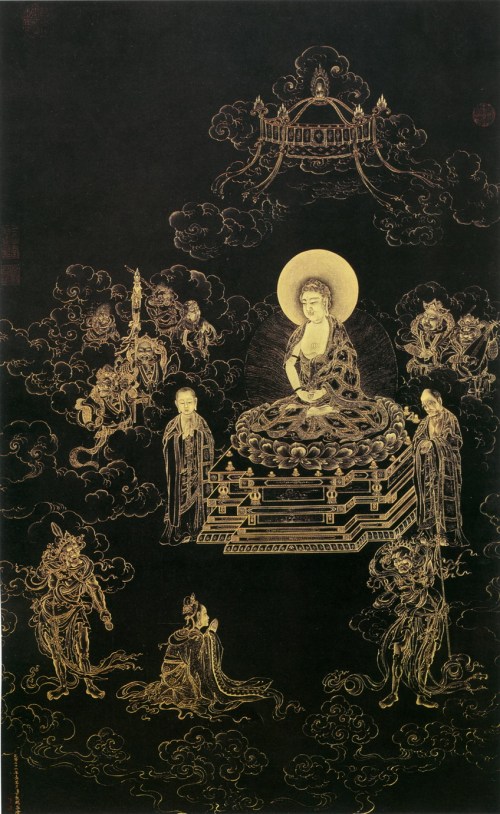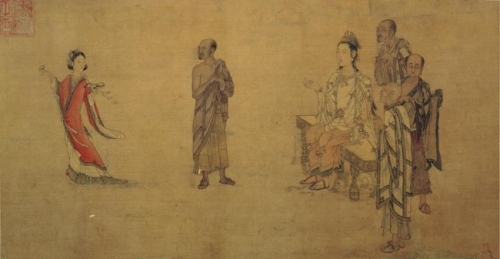第一頌 First Practice
此生幸得暇滿船,自他須渡生死海,故於晝夜不空過,聞思修是佛子行。
At this time when the difficult-to-gain ship of leisure and fortune has been obtained,
ceaselessly listening, contemplating and cultivating day and night
in order to liberate oneself and others from the ocean of samsara
is a practice of the Bodhisattva.
第二頌 Second Practice
貪愛親方如水動,瞋憎怨方似火燃,痴昧取捨猶黑暗,離家鄉是佛子行。
The mind of attachment to loved ones wavers like water.
The mind of hatred of enemies burns like fire.
The mind of ignorance which forgets what to adopt and what to discard is greatly obscured.
Renunciation of one’s fatherland is a practice of the Bodhisattva.
第三頌 Third Practice
遠惡境故惑漸減,離散亂故善自增,心澄於法起定見,依靜處是佛子行。
When harmful places are abandoned, mental defilements gradually diminish.
Without distraction, virtuous endeavors naturally increase.
Being clear-minded, definite understanding of the Dharma arises.
Resorting to secluded places is a practice of the Bodhisattva.
第四頌 Fourth Practice
常伴親友還離別,勤聚財物終棄捐,識客且遺身捨去,捨現世心佛子行。
Long-associated relatives and companions will depart.
Wealth and possessions obtained with effort will be left behind.
Consciousness, the guest, will cast aside the guest-house of the body.
Letting go all attachments to this life is a practice of the Bodhisattva.
第五頌 Fifth Practice
伴彼若使三毒長,並壞聞思修作業,能轉慈悲令喪失,遠惡友是佛子行。
When evil companions are associated with, the three poisons increase,
The activities of listening, contemplation and cultivation decline,
and love and compassion are extinguished.
Abandoning evil companions is a practice of the Bodhisattva.
第六頌 Sixth Practice
依彼若令惡漸盡,功德猶如初月增,則較自身尤愛重,依善知識佛子行。
When a sublime spiritual friend is relied upon, our faults are exhausted
and our qualities increase like the crescent moon.
Cherish the sublime spiritual friend even more than our own body
is a practice of the Bodhisattva.
第七頌 Seventh Practice
自身仍陷生死獄,世間神等能救誰?故於依止不虛者,皈依三寶佛子行。
How could the gods of this world possibly liberate us,
being themselves tied to the prison of samsara?
Instead let us take refuge in the undeceiving Triple Gem
is a practice of the Bodhisattva.
第八頌 Eighth Practice
諸極難忍惡趣苦,能仁說為趣業果,故雖遭遇命難緣,終不造罪佛子行。
The intolerable suffering of the lower realms
is said by the Buddha to be the fruit of Karma;
therefore, even at peril to our life,
never commit negative deeds is a practice of the Bodhisattva.
第九頌 Ninth Practice
三有樂如草頭露,是須臾頃壞滅法,故於無轉解脫道,起希求是佛子行。
The happiness of the three worlds is like the dew on the tip of a blade of grass,
disappearing in an instant.
To aspire to supreme, immutable liberation
is a practice of the Bodhisattva.
第十頌 Tenth Practice
無始時來憫我者,母等若苦我何樂?為度無邊有情故,發菩提心佛子行。
Since beginningless time, our mothers took care of us with tenderness.
What use is our happiness when they still suffer?
To generate Bodhicitta in order to liberate infinite sentient beings
is a practice of the Bodhisattva.










